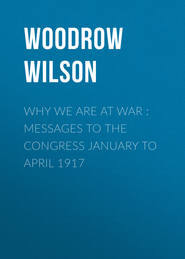По всем вопросам обращайтесь на: info@litportal.ru
(©) 2003-2024.
✖
In Our First Year of the War
Настройки чтения
Размер шрифта
Высота строк
Поля
(December 12, 1917)
The President's proclamation, after citing the resolution of Congress authorizing the war with Austria, says:
Now, therefore, I, Woodrow Wilson, President of the United States of America, do hereby proclaim to all whom it may concern that a state of war exists between the United States and the Imperial and Royal Austro-Hungarian Government, and I do specially direct all officers, civil or military, of the United States that they exercise vigilance and zeal in the discharge of the duties incident to such a state of war.
And I do, moreover, earnestly appeal to all American citizens that they, in loyal devotion to their country, dedicated from its foundation to the principles of liberty and justice, uphold the laws of the land and give undivided and willing support to those measures which may be adopted by the constitutional authorities in prosecuting the war to a successful issue and obtaining a secure and just peace.
NEED ONLY OBEY THE LAWS
And, acting under and by virtue of the authority vested in me by the Constitution of the United States, and the aforesaid sections of the Revised Statutes, I do hereby further proclaim and direct that the conduct to be observed on the part of the United States toward all natives, citizens, denizens or subjects of Austria-Hungary, being males of the age of fourteen years and upward, who shall be within the United States and not actually naturalized, shall be as follows:
All natives, citizens, denizens or subjects of Austria-Hungary, being males of fourteen years and upward who shall be within the United States and not actually naturalized, are enjoined to preserve the peace toward the United States and to refrain from crime against the public safety and from violating the laws of the United States and of the States and Territories thereof.
And to refrain from actual hostility or giving information, aid or comfort to the enemies of the United States.
And to comply strictly with the regulations which are hereby or which may be, from time to time, promulgated by the President.
And so long as they shall conduct themselves in accordance with law, they shall be undisturbed in the peaceful pursuit of their lives and occupations and be accorded the consideration due to all peaceful and law-abiding persons, except so far as restrictions may be necessary for their own protection and for the safety of the United States.
A FRIENDLY ATTITUDE IS URGED
And toward such of said persons as conduct themselves in accordance with law, all citizens of the United States are enjoined to preserve the peace and to treat them with all such friendliness as may be compatible with loyalty and allegiance to the United States.
And all natives, citizens, denizens or subjects of Austria-Hungary, being males of the age of fourteen years and upward, who shall be within the United States and not actually naturalized, who fail to conduct themselves as so enjoined, in addition to all other penalties prescribed by law, shall be liable to restraint or to give security, or to remove and depart from the United States in the manner prescribed by Sections 4069 and 4070 of the Revised Statutes and as prescribed in regulations duly promulgated by the President:
FEW REGULATIONS
And pursuant to the authority vested in me, I hereby declare and establish the following regulations, which I find necessary in the premises, and for the public safety:
1. No native, citizen, denizen or subject of Austria-Hungary, being a male of the age of fourteen years and upward and not actually naturalized, shall depart from the United States until he shall have received such permit as the President shall prescribe, or except under order of a court, judge or justice, under Sections 4069 and 4070 of the Revised Statutes.
2. No such person shall land or enter the United States except under such restrictions and at such places as the President may prescribe.
3. Every such person, of whom there may be reasonable cause to believe that he is aiding or about to aid the enemy, or who may be at large to the danger of the public peace or safety, or who violates or attempts to violate, or of whom there is reasonable ground to believe that he is about to violate any regulation duly promulgated by the President, or any criminal law of the United States, or of the States or Territories thereof, will be subject to summary arrest by the United States Marshal or his deputy, or such other officers as the President shall designate, and to confinement in such penitentiary, prison, jail, military camp or other place of detention as may be directed by the President.
This proclamation and the regulations herein contained shall extend and apply to all land and water, continental or insular, in any way within the jurisdiction of the United States.
XIX
THE GOVERNMENT TAKES OVER THE RAILROADS
(A Statement by the President, December 26, 1917)
I have exercised the powers over the transportation systems of the country which were granted me by the Act of Congress of August, 1916, because it has become imperatively necessary for me to do so.
This is a war of resources no less than of men, perhaps even more than of men, and it is necessary for the complete mobilization of our resources that the transportation systems of the country should be organized and employed under a single authority and a simplified method of co-ordination which have not proved possible under private management and control.
The committee of railway executives who have been co-operating with the Government in this all-important matter have done the utmost that it was possible for them to do; have done it with patriotic zeal and with great ability; but there were differences that they could neither escape nor neutralize.
IN FAIRNESS TO THE RAILROADS
Complete unity of administration in the present circumstances involves upon occasion and at many points a serious dislocation of earnings, and the committee was, of course, without power or authority to rearrange changes or effect proper compensations and adjustments of earnings. Several roads which were willingly and with admirable public spirit accepting the orders of the committee have already suffered from these circumstances and should not be required to suffer further. In mere fairness to them the full authority of the Government must be substituted.
The Government itself will thereby gain an immense increase of efficiency in the conduct of the war and of the innumerable activities upon which its successful conduct depends.
The public interest must be first served, and in addition the financial interests of the Government and the financial interests of the railways must be brought under a common direction. The financial operations of the railways need not then interfere with the borrowings of the Government, and they themselves can be conducted at a great advantage.
INVESTORS TO BE PROTECTED
Investors in railway securities may rest assured that their rights and interests will be as scrupulously looked after by the Government as they could be by the directors of the several railway systems. Immediately upon the reassembling of Congress I shall recommend that these definite guarantees be given:
First, of course, that the railway properties will be maintained during the period of Federal control in as good repair and as complete equipment as when taken over by the Government, and, second, that the roads shall receive a net operating income equal in each case to the average net income of the three years preceding June 30, 1917; and I am entirely confident that the Congress will be disposed in this case, as in others, to see that justice is done and full security assured to the owners and creditors of the great systems which the Government must now use under its own direction or else suffer serious embarrassment.
The Secretary of War and I are agreed that, all the circumstances being taken into consideration, the best results can be obtained under the immediate executive direction of the Hon. William G. McAdoo, whose practical experience peculiarly fits him for the service, and whose authority as Secretary of the Treasury will enable him to co-ordinate, as no other man could, the many financial interests which will be involved and which might, unless systematically directed, suffer very embarrassing entanglements.
A RECOGNITION OF FACTS
The Government of the United States is the only great Government now engaged in the war which has not already assumed control of this sort. It was thought to be in the spirit of American institutions to attempt to do everything that was necessary through private management, and if zeal and ability and patriotic motive could have accomplished the necessary unification of administration, it would certainly have been accomplished; but no zeal or ability could overcome insuperable obstacles and I have deemed it my duty to recognize that fact in all candor, now that it is demonstrated, and to use without reserve the great authority reposed in me.
A great national necessity dictated the action, and I was therefore not at liberty to abstain from it.
Woodrow Wilson.
The text of the proclamation follows:
Whereas, the Congress of the United States, in the exercise of the constitutional authority vested in them, by joint resolution of the Senate and House of Representatives, bearing date April 6, 1917, resolved:
"That the state of war between the United States and the Imperial German Government which has thus been thrust upon the United States is hereby formally declared, and that the President be, and he is hereby, authorized and directed to employ the entire naval and military forces of the United States and the resources of the Government to carry on war against the Imperial German Government, and to bring the conflict to a successful termination, all of the resources of the country are hereby pledged by the Congress of the United States."
And by joint resolution bearing date of December 7, 1917, resolved:
"That a state of war is hereby declared to exist between the United States of America and the Imperial and Royal Austro-Hungarian Government, and that the President be, and he is hereby, authorized and directed to employ the entire naval and military forces of the United States and the resources of the Government to carry on war against the Imperial and Royal Austro-Hungarian Government, and to bring the conflict to a successful termination, all the resources of the country are hereby pledged by the Congress of the United States."
And whereas, it is provided by Section 1 of the act approved August 29, 1916, entitled "An act making appropriations for the support of the army for the fiscal year ending June 30, 1917, and for other purposes," as follows:
"The President, in time of war, is empowered, through the Secretary of War, to take possession and assume control of any system or systems of transportation, or any part thereof, and to utilize the same, to the exclusion as far as may be necessary of all other traffic thereon, for the transfer or transportation of troops, war material and equipment, or for such other purposes connected with the emergency as may be needful or desirable."
And whereas, it has now become necessary in the national defense to take possession and assume control of certain systems of transportation and to utilize the same, to the exclusion as far as may be necessary of other than war traffic thereon for the transportation of troops, war material and equipment therefor, and for other needful and desirable purposes connected with the prosecution of the war.
Now, therefore, I, Woodrow Wilson, President of the United States, under and by virtue of the powers vested in me by the foregoing resolutions and statute, and by virtue of all other powers thereto me enabling, do hereby, through Newton D. Baker, Secretary of War, take possession and assume control at 12 o'clock noon on the twenty-eighth day of December, 1917, of each and every system of transportation and the appurtenances thereof located wholly or in part within the boundaries of the continental United States and consisting of railroads, and owned or controlled systems of coastwise and inland transportation, engaged in general transportation, whether operated by steam or by electric power, including also terminals, terminal companies and terminal associations, sleeping and parlor cars, private cars and private car lines, elevators, warehouses, telegraph and telephone lines and all other equipment and appurtenances commonly used upon or operated as a part of such rail or combined rail and water systems of transportation, to the end that such systems of transportation be utilized for the transfer and transportation of troops, war material and equipment to the exclusion so far as may be necessary of all other traffic thereon, and that so far as such exclusive use be not necessary or desirable, such systems of transportation be operated and utilized in the performance of such other services as the national interest may require and of the usual and ordinary business and duties of common carriers.
It is hereby directed that the possession, control, operation and utilization of such transportation systems hereby by me undertaken shall be exercised by and through William G. McAdoo, who is hereby appointed and designated Director-General of Railroads.
Said director may perform the duties imposed upon him, so long and to such extent as he shall determine, through the boards of directors, receivers, officers and employees of said systems of transportation. Until and except so far as said director shall from time to time by general or special orders otherwise provide, the boards of directors, receivers, officers and employees of the various transportation systems shall continue the operation thereof in the usual and ordinary course of the business of common carriers, in the names of their respective companies.
Until and except so far as said director shall from time to time otherwise by general or special orders determine, such systems of transportation shall remain subject to all existing statutes and orders of the Interstate Commerce Commission, and to all statutes and orders of regulating commissions of the various States in which said systems or any part thereof may be situated. But any orders, general or special, hereafter made by said director shall have paramount authority and be obeyed as such.
Nothing herein shall be construed as now affecting the possession, operation and control of street electric passenger railways, including railways commonly called interurban, whether such railways be or be not owned or controlled by such railroad companies or systems. By subsequent order and proclamation, if and when it shall be found necessary or desirable, possession, control or operation may be taken of all or any part of such street railway systems, including subways and tunnels, and by subsequent order and proclamation possession, control and operation in whole or in part may also be relinquished to the owners thereof of any part of the railroad systems or rail and water systems, possession and control of which are hereby assumed.











